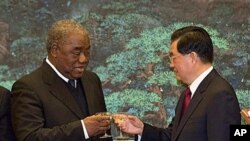Two Chinese managers at a mine in Zambia are to go on trial December 2 on charges of shooting a dozen Zambian mine workers during a demonstration for better working conditions.
The incident has aggravated tensions with labor unions and ordinary Zambians, who believe China is taking advantage of a long-standing relationship with Zambia. The ties date as far back as 1964 when Zambia attained independence from Britain. Zambia was the first country in Africa to establish diplomatic relations with China at that time. Since then, Chinese investors have become increasingly prominent players in Zambia's key economic sectors.
Significant Chinese investment
Some notable Chinese investments in Zambia include the Tanzania-Zambia Railway, the Chambishi Multi Facility Economic Zone and the ongoing construction of a modern soccer stadium, among many others. According to the Zambia Development Agency, Chinese investment has exceeded $1 billion since December 2009 and has created close to 15,000 jobs.
The presence of the Chinese in Zambia's economy, though, has been criticized by trade unions, workers, merchants and opposition political parties. They claim Chinese employers abuse their labor laws, pay low wages and dump sub-standard products on the market.
Chinese employers criticized
The relationship between Zambian workers and Chinese managers has particularly soured since 2005 when 46 workers were killed at a Chinese owned explosive company.
Some workers at Chinese companies in Zambia's mining town of Chambishi complain that they work long hours and in hazardous conditions.
Jeff Chanda, who asked that his real name not be used, works as a front-loader operator at a Chinese owned mine in Chambishi. He said, "What these guys [Chinese] do, they come here, make a lot of money, get our copper and then go back to their country, invest in their country. But here in Zambia there is nothing. 'Cause [Because when] you look at this town, it is just too small. For them to make billions and billions, they are supposed to maintain the roads, build a hospital for us, but there is nothing [they are doing] for us."
Twenty-nine year-old Daniel Mwanza [not his real name], a plant attendant at the Chinese owned NFC Africa Mining agreed. He said many Zambians opt to work in Chinese companies because of limited employment opportunities elsewhere.
"Ah, what I can say is the Chinese, but we have nothing we can go… we are just working at NFC at the Chinese compound because if you stop maybe you can look for another job but you can't find it," said Mwanza.
Zambians claim abuse
The National Union of Miners and Allied Workers looks after the welfare of workers in the mining industry. The union said that when Chinese investors started coming to invest in Zambia, the labor movement explained what was required of the Chinese.
The president of the National Union of Miners and Allied Workers, Mundia Sikufele, explains. "Just from the word go we had engaged them trying to work with us to see how they were going to apply themselves as regards the labor laws of the republic. They were very keen to adhere to the labor laws. Unfortunately, down the line, we discovered they had their own failures in the areas of safety in the mines, in the areas of remuneration for the workers. They happened to and they still happen to be the lowest payers."
The Zambia government has always maintained the Chinese conduct their business within the confines of Zambian investment and labor laws. Ministers and other government officials have stated on several occasions that China always stands by Zambia, even when the global economy is not doing well.
Mines Minister Maxwell Mwale said China was the only country that supported Zambia when it struggled to recover from the global economic crisis. He said some Chinese investors bought off some Australian and Canadian mines that had shut down as a result of the global economic crunch.
Zambia government defends China
Mwale is backed by Commerce, Trade and Industry Minister, Felix Mutati. "Of the total ore that is mined, only 15 percent is attributable to the Chinese mining activities," said Mutati. "So there is 85 percent which is done by Australians, Canadians, Indians and, indeed, other nationals. So to say it's a Chinese problem is wrong. The problem is a central problem."
President Rupiah Banda's administration has been criticized for allegedly siding with the Chinese. Mr. Banda and his administration, however, have maintained they do not take sides. This is evidenced in the remarks issued by Mr. Banda after 13 miners were shot and wounded at a Chinese owned coal mine last October.
"This business about Chinese... Chinese... is like you want to create phobia against people," said Banda. "That is obviously wrong! And as government we have taken a definite position, we have detained these people; we have had discussions with the Chinese ambassador. He, too, agrees with us and advised his people to follow the labor laws of the country. I want everybody to feel at home. If they make a mistake, face the wrath of the law."
China has overtaken the United States to become Zambia's largest export destination for raw materials, such as copper and iron ore.
The Asian nation has assembled an expansive investment portfolio in Zambia, which is expected to grow further with new discoveries of raw materials like uranium and gold.
Chinese Managers at Zambia Mine Go on Trial











